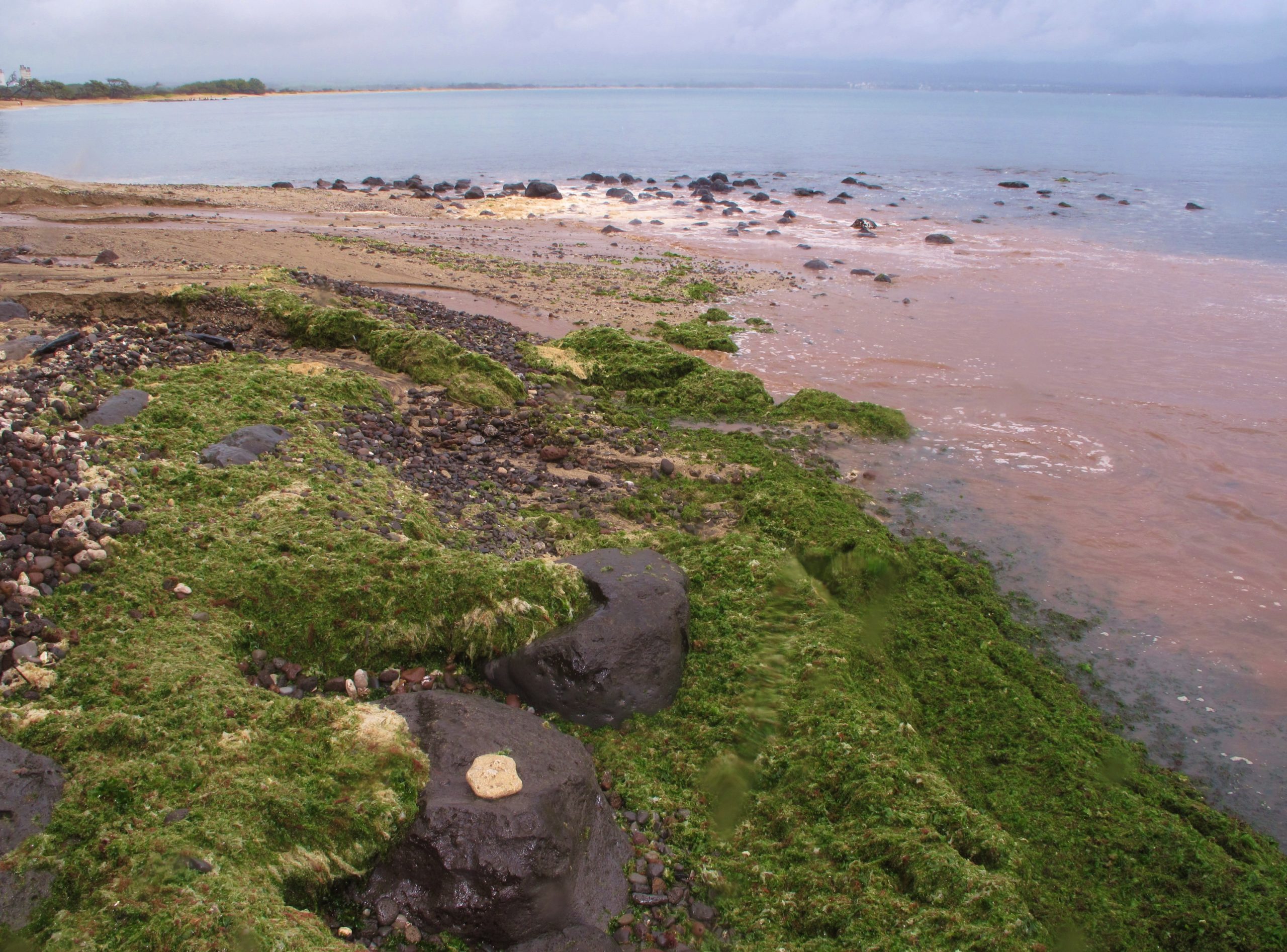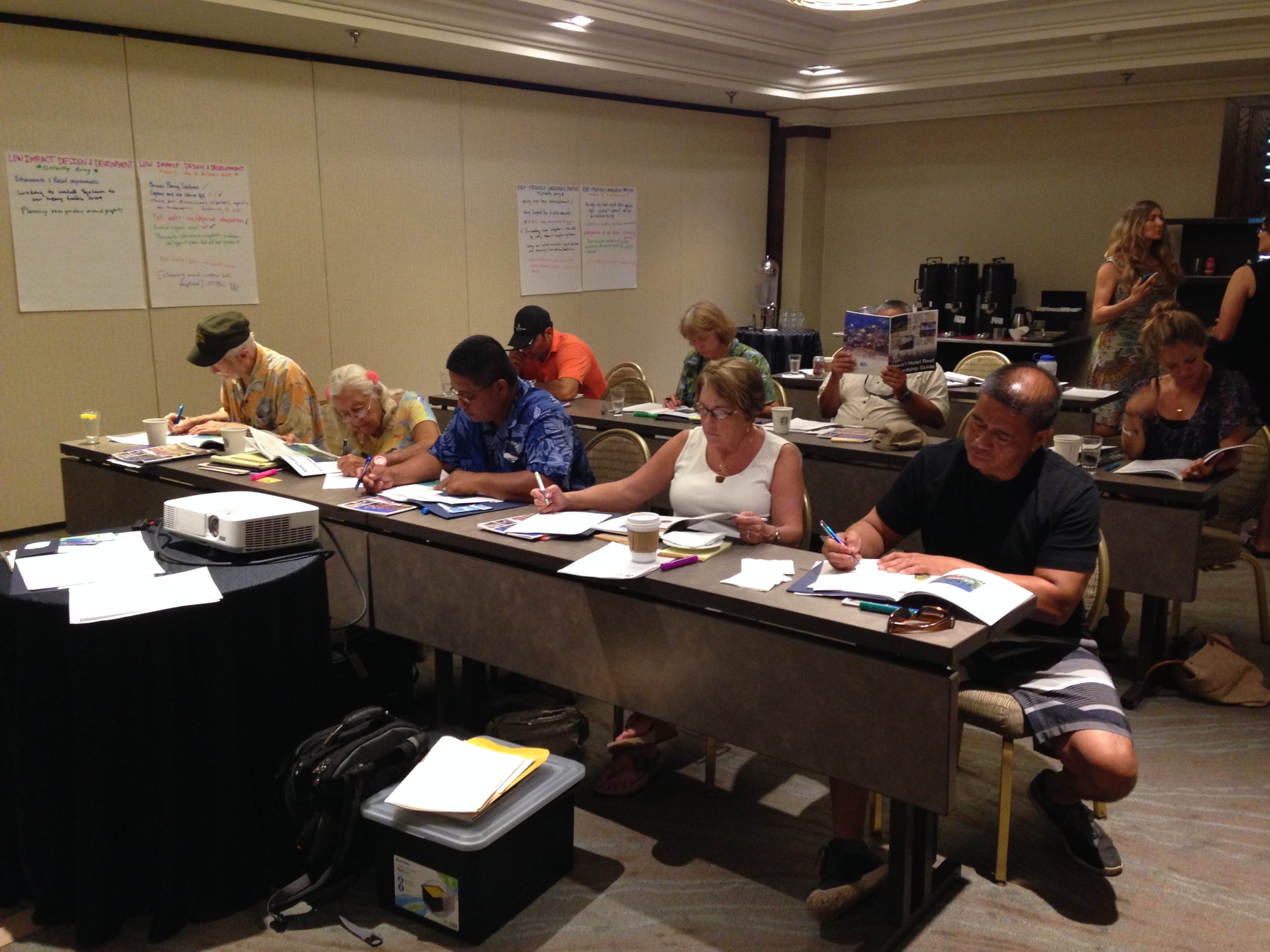
From a conservation point of view, we don’t often think of coral reefs going hand in hand with construction and development. But they do—coral reefs attract tourists, and with tourism comes infrastructure. Coral reefs also provide benefits to communities, and people tend to concentrate in areas where they can reap those benefits.
Over the years coral reefs along Maui’s West coast have fallen victim to this cycle. As more houses, hotels, roads, and other infrastructure projects are created, more and more rainwater runs off into the ocean, bringing with it nutrients and sediment that are harmful to the reefs.
Earlier this summer we partnered with the Sustainable Living Institute of Maui (SLIM) to hold a six-week course for West Maui’s landscapers, landowners, and accommodations industry professionals to address this issue. The course taught them about various low impact design (LID) principles they could implement in landscape and construction projects to help reduce the amount of polluted water running off into the ocean during storms.
LID uses the principles of nature to design landscape and development plans that preserve the natural function of a watershed. For example:
- Build parking lots with pervious pavement. This allows water to seep deep into the soil where nutrients and sediment are filtered out.
- Design rain gardens and install them near beach park showers to help absorb water runoff.
- Catch rainwater and use it to irrigate landscapes, thereby reducing the amount of water running off of roofs after rain falls, and to prevent the need to use valuable potable water to irrigate.

If we work to restore the watershed to its natural state, we can divert stormwater from entering the ocean and help improve the water quality for coral reefs.
Individuals from seven different properties attended and represented more than 100 acres of coastline. One participant came all the way from Lanai in order to learn more and bring LID principles back to his hotel, The Four Seasons, Lanai. In fact, we are proud to report that participants are taking action and each one developed a sustainability project that they are implementing on their property.
“Through this course we invested in human resources and knowledge, and that goes really far,” says Wes Crile, CORAL’s Hawaiʻi-based program manager and coordinator of the course. “It’s one thing to build a rain garden for someone, it’s another thing to educate them on how to build it. We’re building a collaborative group of LID advocates who will now spread the word.”
Coral reefs are a vital habitat for marine life, supporting nearly a quarter of all marine animals. By protecting them, we’re also protecting one of the most biodiverse ecosystems on the planet. But keeping coral reefs healthy isn’t just beneficial for the environment, it’s also beneficial for communities. Coral reefs are an important source of protein for more than one billion people worldwide—and they provide vital livelihoods for families. They also help protect the coastline from large storm waves. Hotels are also finding it’s in their best interest to protect them. In Hawaiʻi alone, reefs bring in more than $10 million in tourism revenue annually. Sustainable practices are no longer a trend, they are here to stay. More and more travelers seek to support businesses that help protect the environment.
When hotels invest and take the time to educate their staff they help build a vital skill set and knowledge that gives employees an opportunity to talk about sustainability initiatives to their guests.
Take the Kahana Sunset Condominiums—longtime resident and site manager, Jackie Scheibel, attended the course and she is helping to pave the way with a new public walkway that will provide easy beach access. She is actively using her new LID skills and will use big planters to filter stormwater as it comes off the road and place native plants along the hillside to help stabilize sediment. In addition, she will use pervious pavement so water will sink into the ground instead of running into the ocean.
Just imagine what would happen if these LID practices were implemented across large coastal properties—we could potentially divert millions of gallons of stormwater from entering West Maui’s marine environment each year.
Help CORAL and hotels such as The Four Seasons and Kahana Sunset continue this great work! Show your support and help provide a more secure future for the communities and industries that rely on coral reefs by ensuring reefs have the clear, nutrient-free water they need to survive.
